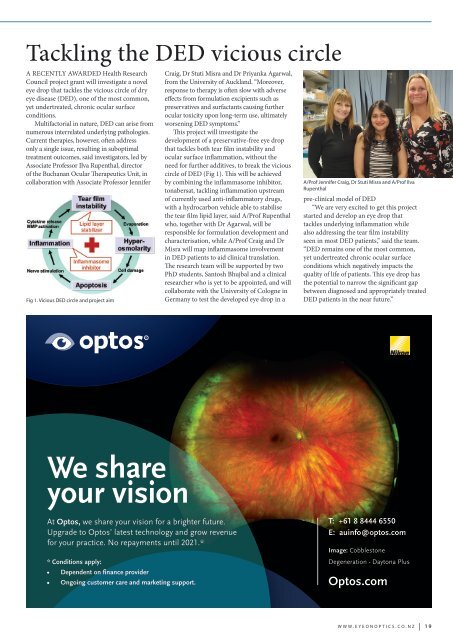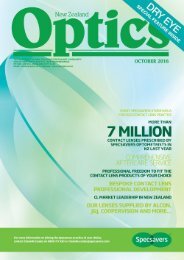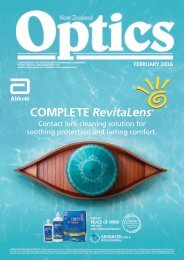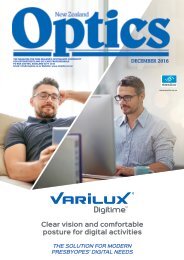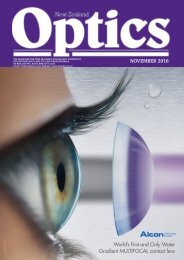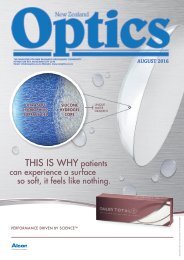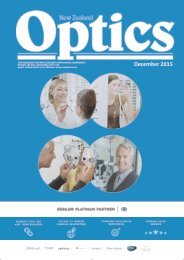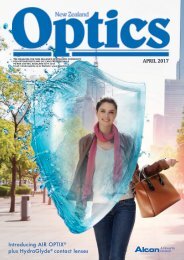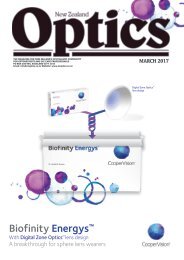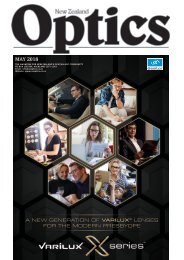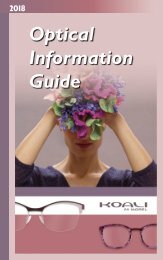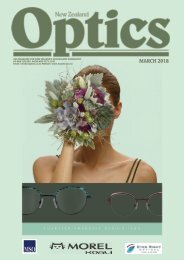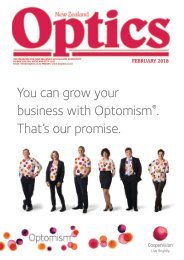Create successful ePaper yourself
Turn your PDF publications into a flip-book with our unique Google optimized e-Paper software.
Tackling the DED vicious circle<br />
A RECENTLY AWARDED Health Research<br />
Council project grant will investigate a novel<br />
eye drop that tackles the vicious circle of dry<br />
eye disease (DED), one of the most common,<br />
yet undertreated, chronic ocular surface<br />
conditions.<br />
Multifactorial in nature, DED can arise from<br />
numerous interrelated underlying pathologies.<br />
Current therapies, however, often address<br />
only a single issue, resulting in suboptimal<br />
treatment outcomes, said investigators, led by<br />
Associate Professor Ilva Rupenthal, director<br />
of the Buchanan Ocular Therapeutics Unit, in<br />
collaboration with Associate Professor Jennifer<br />
Fig 1. Vicious DED circle and project aim<br />
Craig, Dr Stuti Misra and Dr Priyanka Agarwal,<br />
from the University of Auckland. “Moreover,<br />
response to therapy is often slow with adverse<br />
effects from formulation excipients such as<br />
preservatives and surfactants causing further<br />
ocular toxicity upon long-term use, ultimately<br />
worsening DED symptoms.”<br />
This project will investigate the<br />
development of a preservative-free eye drop<br />
that tackles both tear film instability and<br />
ocular surface inflammation, without the<br />
need for further additives, to break the vicious<br />
circle of DED (Fig 1). This will be achieved<br />
by combining the inflammasome inhibitor,<br />
tonabersat, tackling inflammation upstream<br />
of currently used anti-inflammatory drugs,<br />
with a hydrocarbon vehicle able to stabilise<br />
the tear film lipid layer, said A/Prof Rupenthal<br />
who, together with Dr Agarwal, will be<br />
responsible for formulation development and<br />
characterisation, while A/Prof Craig and Dr<br />
Misra will map inflammasome involvement<br />
in DED patients to aid clinical translation.<br />
The research team will be supported by two<br />
PhD students, Santosh Bhujbal and a clinical<br />
researcher who is yet to be appointed, and will<br />
collaborate with the University of Cologne in<br />
Germany to test the developed eye drop in a<br />
A/Prof Jennifer Craig, Dr Stuti Misra and A/Prof Ilva<br />
Rupenthal<br />
pre-clinical model of DED<br />
“We are very excited to get this project<br />
started and develop an eye drop that<br />
tackles underlying inflammation while<br />
also addressing the tear film instability<br />
seen in most DED patients,” said the team.<br />
“DED remains one of the most common,<br />
yet undertreated chronic ocular surface<br />
conditions which negatively impacts the<br />
quality of life of patients. This eye drop has<br />
the potential to narrow the significant gap<br />
between diagnosed and appropriately treated<br />
DED patients in the near future.”<br />
We share<br />
your vision<br />
At Optos, we share your vision for a brighter future.<br />
Upgrade to Optos’ latest technology and grow revenue<br />
for your practice. No repayments until 2021.*<br />
* Conditions apply:<br />
• Dependent on finance provider<br />
• Ongoing customer care and marketing support.<br />
T: +61 8 8444 6550<br />
E: auinfo@optos.com<br />
Image: Cobblestone<br />
Degeneration - Daytona Plus<br />
Optos.com<br />
WWW.EYEONOPTICS.CO.NZ | 19


